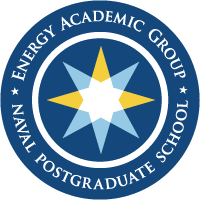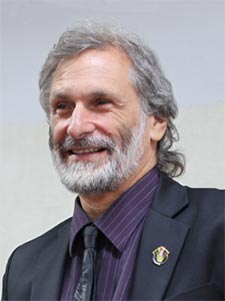July 17, 2015 - Energy Academic Group
OMEGA: A life-support system for spaceship earth
July 17, 2015
ME Lecture Hall
1300
Dr. Jonathan Trent
OMEGA Project Scientist, Bioengineering Branch, NASA Ames Research Center
Abstract
OMEGA emerged from NASA’s Advanced Life Support research that allows us to contemplate human exploration of Mars and helps us address looming problems with energy, water, and food here on Earth. OMEGA, an acronym for “Offshore Membrane Enclosures for Growing Algae,” began as a project to grow algae for biofuels and evolved into an ecosystem of technologies that generates sustainable energy, turns wastewater into drinking water, and provides food without using land.
OMEGA combines and optimizes new and emerging technologies for energy production, wastewater purification, and aquaculture. In protected ocean bays, OMEGA’s floating platforms are covered with water-cooled solar panels that produce electricity and heat. The electricity runs pumps that circulate nitrogen- and phosphorus-rich wastewater through a network of clear, flexible plastic tubes to grow oil-rich algae, which are harvested and processed into biofuels.
In addition to making all-important liquid biofuels, the algae capture CO2 that would otherwise be in the atmosphere as a greenhouse gas. And they remove nutrients and contaminants from the wastewater as a first step in a unique OMEGA process that turns wastewater into drinkable water at a fraction of the cost of desalination technologies for seawater.
Add the use of OMEGA’s floating infrastructure by aquaculture farmers to cultivate oysters, crabs, fish, or whatever is an appropriate crop for the location, and the OMEGA system makes a valuable contribution to local food production. And as the OMEGA ecosystem of technologies provides energy, water, and food, it creates a diversity of interesting jobs that support a sustainable economy.
We will discuss the $10.8 million OMEGA feasibility study supported by NASA and the California Energy Commission from 2010 to 2013 and the OMEGA Global Initiative (OGI), a recently founded nonprofit corporation 501(c)(3) to identify OMEGA sites, mobilize local OMEGA developers, mitigate developmental risks, and facilitate successful OMEGA implantation, operation, and, ultimately, commercialization globally.
Biography
After receiving his Ph.D. in Biological Oceanography at Scripps Institution of Oceanography, Dr. Trent spent six years in Europe at the Max Planck Institute for Biochemistry in Germany, the University of Copenhagen in Denmark, and the University of Paris at Orsay in France. He returned to the USA to work at the Boyer Center for Molecular Medicine at Yale Medical School for two years before establishing a biotechnology group at Argonne National Laboratory. In 1998 he moved to NASA Ames Research Center to be part of NASA’s Astrobiology program and in 1999 he founded the Protein Nanotechnology Group. In 2007, with support from Google, he began a project called “Sustainable Energy for Spaceship Earth,” which led to the OMEGA project. From 2010-2013 he led a multidisciplinary OMEGA research group with funding from NASA and the California Energy Commission. In addition to working at NASA, he is concurrently an Adjunct Professor in both the Dept. of BioMolecular Engineering at UC Santa Cruz and in the Dept. of Biotechnology and Life Sciences at Tokyo University for Agriculture and Technology. He is also a fellow of the California Academy of Sciences and the Acting Director of the 501(c)(3) OMEGA Global Initiative (OGI).
POC
Dr. Daniel A. Nussbaum
Naval Postgraduate School
Principal, Energy Academic Group
Monterey CA 93943
Phone: 831-656-2387
Mobile: 831-324-3228
Email: dnussbaum@nps.edu


